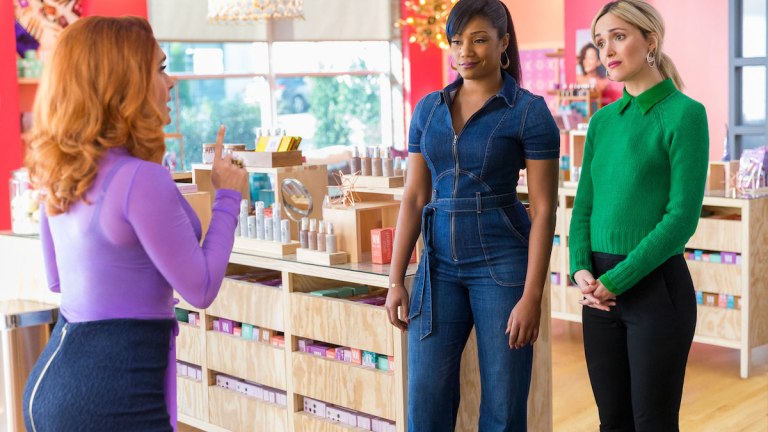Like a Boss Review: Not Worth Investing In
Bland comedy in Like a Boss tries for long lasting lessons about female friendship, but it still needs to perfect the formula.

There is something incredibly telling about the fact that two men wrote Like a Boss, a lighthearted comedy about finding your person (be that a friend or significant other) wrapped up in a shallow satire of the cosmetics industry. And while Sam Pitman and Adam Cole-Kelly’s script has a few chuckles, with stars Tiffany Haddish, Rose Byrne, and Salma Hayek committing to their bits like a Sephora expert determined to send their client out into the world with her dream look, none of it sticks. In fact, I kind of hate it.
Mia (Haddish) and Mel (Byrne) are high school besties turned codependent adults, and they love nothing more than to echo Grey’s Anatomy’s most enduring catchphrase while nevertheless demonstrating there’s a huge chasm between finding your person and maintaining a healthy relationship with them. The fact that they run a self-named makeup business further complicates their friendship, as years of passive aggression and failed communication all but delivers them on a silver platter to cosmetics queen Claire Luna (Hayek). The face (and boobs) of skincare company Oviedo, Claire magnanimously offers to pay off Mia & Mel’s half-a-million in debt… so long as she gets a controlling stake in their company.
Hayek’s vulture capitalist simpers over how well these girls have done for themselves, clearly seeing them as girls and herself as a woman: smarter, savvier, and more deserving of profiting off the success of their cheekily accessible products like the One Night Stand Kit. What follows is a clawless comedy in which two platonic soulmates must maintain their business partnership, lest their dreams get snatched away by a tiny, golf-club-wielding caricature of a successful woman who supposedly “has it all.”
Having it all is a familiar plague to any woman that Like a Boss should be able to interrogate, but there are too many clashing ingredients in this batch. It’s not that Mia and Mel are struggling with the archetypal money changes everything lesson in fiction: They don’t even get to reach Claire’s heights of wealth and access; her investment simply brings them out of the red, and that’s enough to drive a wedge between them.
Their contradictory approaches to business, with Mel being the people-pleasing accountant and Mia acting as the take-no-prisoners creative genius, are shelved in favor of stoking an unlikely rivalry between two such clearly complementary founders. Byrne and Haddish gamely try to play to the movie’s narrative derailment of girl-on-girl sabotage, but the pranks neither commit to the level of Bridesmaids’ bathroom scene nor utilize Haddish’s talents with food à la Girls Trip. But their emotional bond is so strong that this conflict feels shoehorned in.
A potentially more interesting subplot exists due to the twosome’s other friends (Jessica St. Clair, Natasha Rothwell, and Ari Graynor) who appear to have grown up and beyond them, mostly by having babies. But despite Mia and Mel’s insistence that their business is their baby, their unorthodox parenting—like spending the night before a make-or-break presentation doing last minute brainstorming—makes them seem more entry-level rookies rather than Head Bitches in Charge (HBICs). Frankly, the friction between these thirtysomethings judging what success looks like is much more interesting than Claire’s attempts to break up this quirky team.
Kudos to Pitman and Cole-Kelly for tapping into that relatable tension; yet these scenes are still few and far-between in a film confused about its message.
Over and over, Like a Boss almost says something profound. In each of these conflicts, Mia and Mel are presented as the “befores,” and somehow lesser than the “afters:” single partiers versus saintly moms; a charmingly clashing duo versus Hayek’s streamlined solo entrepreneur; earnest businesswomen trying to hold on to their original company ethos instead of pragmatic boss-ass bitches willing to go with what sells, no matter how disingenuously.
But how the movie portrays these conflicts is so formulaic it may as well be a by numbers makeup tutorial. When Byrne and Haddish play to their respective comedy strengths, it’s endearing: Bridesmaids proved that Byrne nails the nuances of passive-aggressive white-lady dynamics, and Haddish is a beacon in every vehicle, the most dynamic one-liner-slinger in any squad. But this story—again, seen through a gaze that, despite its attempts to “get women,” is still male—is not deserving of their talents.
For all of its efforts, Like a Boss is unfortunately nothing more than that fleeting thrill of an in-store makeover: fun in the moment, but nothing that would actually compel you to buy the products.
read more: Must See Movies of 2020
Natalie Zutter would watch Tiffany Haddish and Rose Byrne sing all the karaoke. Share your favorite cinematic female friendships with her on Twitter @nataliezutter!
